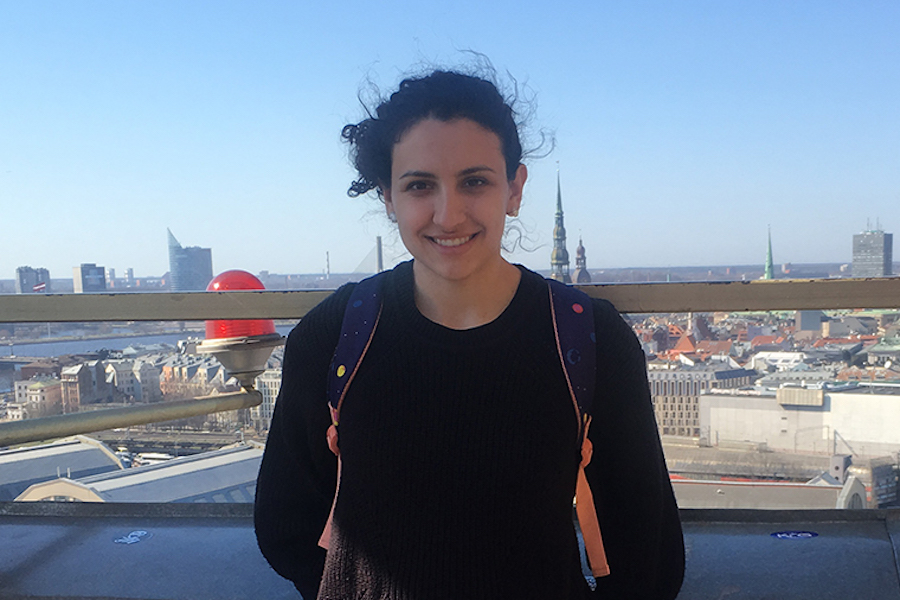FSU alumna finds harmony in foreign language, military service

While some seniors spend their final semesters planning one last blowout spring break, Florida State University’s Stephenie Reid had a different plan. The Russian language major and Army ROTC cadet spent hers studying abroad in the midst of a brutal Baltic winter.
The time she spent immersed in the Baltic region and its culture was surreal, but Reid said she now holds a deeper understanding of the benefits foreign language skills generate for one’s career: Upon conclusion of her studies, Reid flew back to the U.S. to pick up her bachelor’s degree and receive her commission as a second lieutenant in the Air Force.
“I’ve always had an interest in working for the government. As I grew older, I realized how many veterans eventually follow that path,” Reid said. “After learning about the U.S. Air Force and training in ROTC for a few semesters, I thought I would enjoy a full career as an Airman. I signed up for the dual-degree program and became much more involved after that.”
Language skills and experience abroad set recruits apart from the pack in the eyes of military recruiters. With missions taking place all around the world, bilingual abilities are an invaluable tool. Luckily, Reid’s interests lined up perfectly.
Through the ROTC program Project Global Officer, she was given the chance to spend part of her summers during 2017 and 2018 in Estonia. Project GO is a scholarship and study-abroad language program designed for cadets to learn critical languages in an immersion setting.
After an extensive application process, Reid was selected from a competitive group to study overseas in Riga, Latvia, through the Boren Scholarship program from January to April 2019. While the schooling was rigorous and required long hours, Reid was motivated by the immersion in history and culture.
“It’s difficult for me to find people in Tallahassee who are passionate about the history, culture and language of the Baltic region. Many are interested in just learning the language,” Reid explained. “Living in the country surrounded by students who were eager to learn about the political side of the language was incredible. There were always people talking about things I wanted to talk about, too.”
Her schoolwork at FSU included courses on the history of the Baltic region with FSU international affairs adjunct professor Eman Vovsi and the study of Russian folklore and fairy tales with associate professor of Slavic studies Robert Romanchuk.
Both professors saw great potential in Reid and encouraged her to apply for a David L. Boren Scholarship, a program designed to help undergraduate students study abroad in areas that are critical to U.S. interests and underrepresented in study abroad. Vovsi, a native of Riga, worked with Reid to find a university that fit her best.
“Under my supervision, she has tirelessly pursued every extracurricular opportunity to master her Russian language skills and she achieved quite the progress for a relatively short period of time. No doubt, this made her an excellent candidate to receive a prestigious Boren award,” Vovsi said.
Reid’s interest in the Baltic region began long before she arrived at Florida State. As a gifted child musician, she was granted the opportunity to travel abroad in pursuit of music education, visiting the Czech Republic at the age of 13. While perfecting her skill as a flutist, she took note of the lasting marks that Soviet Union leadership left on Eastern Europe and became curious about the region.
Her desire to enroll at FSU grew due to the strong political science and international affairs programs in the state’s capital. As a first-generation college student, Reid cultivated her curiosity about the Baltic region by taking Russian language classes. It was her fascination with the specificities of Eastern Europe that led to her transfer into the Department of Modern Languages and Linguistics as a Russian language major at the end of her sophomore year.
Linguistically, because the Baltic countries of Estonia, Latvia and Lithuania are in close proximity, language and culture, they are often grouped together. Reid, however, worked to understand the differences among the countries, the problems each faces and how the commonalities and contrasts interact.
Her long-term goals include pursuing a career as a foreign area officer or air attaché, while her immediate plans include waiting for assignment and applying for the Olmstead Foundation.
This scholar program, similar to the Boren Scholarship, is open only to active military personnel. Being an Olmstead scholar challenges young officers who demonstrate cultural curiosity to learn a foreign language and pursue graduate studies in that language at a foreign university.
According to the Olmstead Foundation, living on their own in a foreign country gives scholars a new world view that is unachievable without total immersion into local customs, traditions, values, history, politics and pop culture.
As someone who learned a language later in life, Reid advises others to keep an open mind.
“I struggled with Spanish in high school, and I wasn’t interested in other languages. Visiting Estonia opened my eyes to the Russian language, and even though learning a language is difficult, it’s possible. I found I really enjoyed Russian, and my interest in it made it even more accessible,” Reid said. “No matter if you think you’re too old or too busy to learn a language, it’s not impossible; it’s actually fun!”
